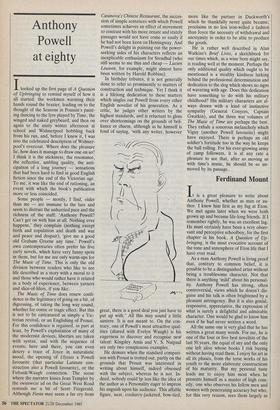Anthony Powell at eighty
Ilooked up the first page of A Question of Upbringing to remind myself of how it all started: the workmen warming their hands round the brazier, leading on to the thought of the Seasons in Poussin's paint- ing dancing to the lyre played by Time, the winged and naked greybeard, and then on again to the misty winter afternoon at school and Widmerpool hobbling back from his run, and, before I knew it, I was into the celebrated description of Widmer- pool's overcoat. Where does the pleasure lie, how does it manage to draw one on so? I think it is the stickiness, the resonance, the reflective, ambling quality, the anti- cipation of a long journey — sensations that had been hard to find in good English fiction since the end of the Victorian age. To me, it was like the end of rationing, an event with which the book's publication more or less coincided.
Some people — mostly, I find, older than me — are immune to the lure and seem to distrust the unhurried pace and the richness of the stuff: `Anthony Powell? Can't get on with him at all. Nothing ever happens,' they complain (nothing except birth and copulation and death and war and peace and despair), 'give me a good old Graham Greene any time.' Powell's own contemporaries often prefer his five early novels, which have very funny spots in them, but for me are only warm-ups for The Music of Time. This is only the old division between readers who like to see life described as a story with a moral to it and those who would rather have it related as a body of experience, between yarners and slice-of-lifers, if you like.
The Music of Time does renew confi- dence in the legitimacy of going on a bit, of digressing, of taking the long way round, whether for comic or tragic effect. But this is not to be caricatured as simply a Vic- torian revival, or an Englishing of Proust. For this confidence is regained, in part at least, by Powell's exploitation of many of the modernist devices; liberties are taken with syntax, and with the sequence of events; here- and there, you can even descry a trace of Joyce in naturalistic mood, the opening of Ulysses a Powell favourite (that particular Latinate con- struction also a Powell favourite), or the Firbank/Waugh connection. The scene where the narrator kisses Jean Templer by the swimwear ad on the Great West Road reminds me a bit of Scott Fitzgerald. Although Fiesta may seem a far cry from Casanova's Chinese Restaurant, the succes- sion of simple sentences with which Powell sometimes achieves an effect of movement to contrast with his more ornate and stately passages would not have come so easily if he had not been keen on Hemingway. And Powell's delight in pointing out the power- seeking sides of his characters reflects an inexplicable enthusiasm for Stendhal (who still seems to me thin and cheap — Lucien Leuwen, for example, might almost have been written by Harold Robbins).
In birthday tributes, it is not generally done to refer so prominently to matters of construction and technique. Yet I think it is a lifelong dedication to these matters which singles out Powell from every other English novelist of his generation. As a critic, he judges other writers by the highest standards, and is reluctant to gloss over shortcomings on the grounds of bril- liance or charm, although as he himself is fond of saying, 'with any writer, however great, there is a good deal you just have to put up with.' All this may sound a little austere. It is not meant to. On the con- trary, one of Powell's most attractive qual- ities (shared with Evelyn Waugh) is his eagerness to discover and recognise new talent: Kingsley Amis and V. S. Naipaul are only two conspicuous examples.
He demurs when the standard compari- son with Proust is trotted out, partly on the grounds that Proust was interested in writing about himself, indeed obsessed with the subject, whereas he is not. In- deed, nobody could be less like the idea of the author as a Personality eager to impress his anguish upon his audience. This affable figure, neat, corduroy-jacketed, bow-tied, more like the partner in Duckworth's which he thankfully never quite became, proclaims in no less iron-willed a fashion than Joyce the necessity of withdrawal and anonymity in order to be able to produce the goods.
He is rather well described in Alan Watkins's Brief Lives, a sketchbook for our times which, as a wine bore might say, is reading well at the moment. Perhaps the only additional quality which ought to be mentioned is a stealthy kindness lurking behind the professional determination and dedication to the slog which shows no signs of wavering with age. Does this dedication have something to do with his military childhood? His military characters are al- ways drawn with a kind of instinctive sympathy (General Conyers, Captain Gwatkin), and the three war volumes of The Music of Time are perhaps the best. They exhale a sonorous melancholy which Vigny (another Powell favourite) might have enjoyed. There is perhaps an old soldier's fortitude too in the way he keeps the ball rolling. For his ever-growing army of camp followers, it is at any rate a pleasure to see that, after so moving us with time's music, he should be so un- moved by its passage.
Ferdinand Mount


















































































 Previous page
Previous page